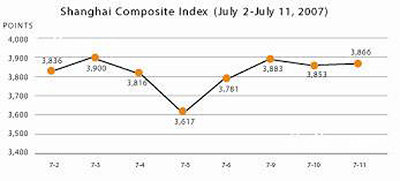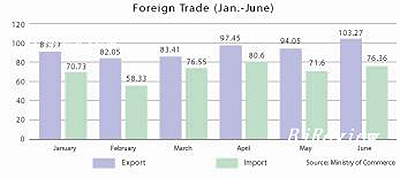|
ability. Many listed exporting companies have reported profit plunges due to the tax rebate policy change. Many smaller and less efficient companies will go bankrupt as they are released from government support on which they had depended for so many years.
S

tatistics from the General Administration of Customs show in the first half of this year, the total foreign trade volume of China reached $980.93 billion, growing 23.3 percent compared with the first half of last year. Among this, a total of goods worth of $546.73 billion were exported, and $434.2 billion were imported, growing 27.6 percent and 18.2 percent respectively.
The Chinese Government has vowed to curb its surging trade surplus. Whether it can make it depends on the trade figures of July.
Tourism Blooms
Both inbound and outbound tourism markets are expanding rapidly in China.
According to Shao Qiwei, head of the National Tourism Administration, China received 21.53 million visitors from overseas in the first five months of this year, increasing 10.1 percent from the same period last year. China earned $14.8 billion from the overseas visitors, up 13.1 percent from a year earlier period.
While foreign visitors are pouring in, an increasing number of the Chinese people are traveling abroad.
Shao said China's outbound tourists totaled 16.03 million in the first five months, growing 14 percent. The pace of growth is a lot more than the tourism administration's forecast of 10 percent during the 11th Five-Year Plan (2006-10).
Chinese travelers are not only growing in numbers, but also in the money they spend. Shao said their expenditures while traveling abroad are growing at an average 10 percent each year.
Many Chinese prefer new destinations, many of which are European and North American countries.
The United Nation's World Tourism Organization said China will become the fourth largest source of outbound tourists in the world by the mid-2010s, instead of the original expectation of 2020.
No More Free Lunch

Starting from August 1 this year, a 5 percent export tax will be imposed on crude oil exports by foreign partners cooperating with Chinese companies in offshore oil exploration, according to the Ministry of Finance and the General Administration of Customs.
Foreign partners which are executing contracts already signed will be granted a five-year "tax free" period.
China levied export tariffs from November on exports of resource-intensive products, such as oil and metals. Crude oil exports by Chinese companies are subject to 5 percent export tariff.
Exploring offshore oil is risky and requires advanced technology. In the past, due to the lack of technology, China adopted favorable policies to attract foreign cooperation to jointly explore the offshore oil. The crude oil exported by the foreign side was exempt from export tax.
Currently, the biggest offshore oil company is China National Offshore Oil Corp., also the third largest oil company in China. Its overseas partners include ConocoPhilips, Husky Energy, Devon Energy Corp., Chevron Texaco, Anadarko Petroleum Corp. and BG Group.
Experts believe the new policy promotes fair play in the market. "The move is aimed at saving domestic resources and bringing the policy for foreign companies in line with that for the domestic companies," said oil analyst Gong Jinshuang.
Open Skies
More Chinese cities will be open to the U.S. passengers after an aviation agreement was signed on July 10 between China and the United States.
With the agreement, all of central China's provinces (Anhui, Hunan, Hubei, Jiangxi, Henan and Shanxi) will be open for direct flights between the two countries.
Commercial passenger flights between the United States and east China are expected to double by 2012.
U.S. airlines are permitted to increase their flights to China from 10 to 23.
It is estimated that the agreement will generate as much as $5 billion in passenger and cargo revenue for the airline industry, and as much as $8 billion in new economic activities in the United States, said the U.S. Transportation Secretary Mary Peters. Logistics companies like the United Parcel Services and FedEx Corp. are believed to be the biggest winners from this agreement.
However, the Chinese side may not benefit as much as their U.S. counterparts. One source said China's three largest airlines were losing money in the passenger and cargo sector, and the new agreement will add more pressure. Yang Yuanyuan, head of the Civil Aviation Administration of China, urged the United States to make it easier for Chinese citizens and tourist groups to get visas in order to promote balanced development. | 